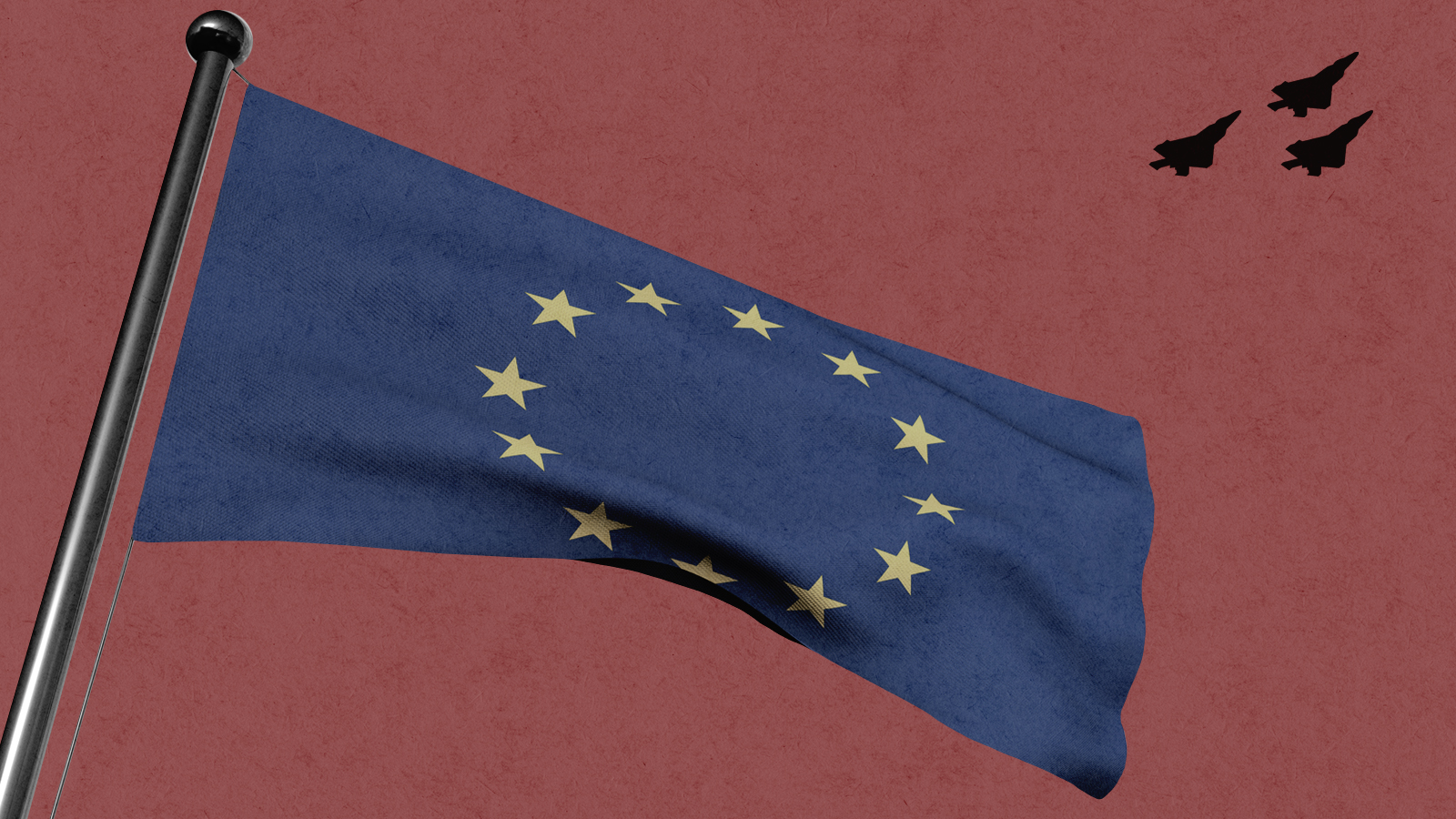Europe can stand on its own. The Ukraine invasion proves it.
Western nations on the continent are ready to face their own military destiny

A free daily email with the biggest news stories of the day – and the best features from TheWeek.com
You are now subscribed
Your newsletter sign-up was successful
In Washington, Russia's attack on Ukraine has been a call to arms. The United States has not only sped up weapons shipments to Ukraine's beleaguered military, it has announced the deployment of 15,000 new troops to Eastern Europe since the crisis began, with more possibly to come. Congress just voted to boost the defense budget to $783 billion, an increase of about $40 billion in just one year, largely in the name of answering the Russian threat.
Pundits, meanwhile, see a new geopolitical reality: one where European security cannot be taken for granted; where the U.S. cannot afford to shift its focus from Europe to Asia or domestic troubles, and where visions of European "strategic autonomy" apart from the U.S. have proven a fantasy.
These views are wrong, and the U.S. military reaction is unnecessary. In fact, Russia's invasion of Ukraine reveals surprising weakness, and Europe's response shows its ability to handle Russia's threat without U.S. help. The war in Ukraine is a crime, a tragedy, and an opportunity for the United States to transition responsibility for European security to Europeans.
The Week
Escape your echo chamber. Get the facts behind the news, plus analysis from multiple perspectives.

Sign up for The Week's Free Newsletters
From our morning news briefing to a weekly Good News Newsletter, get the best of The Week delivered directly to your inbox.
From our morning news briefing to a weekly Good News Newsletter, get the best of The Week delivered directly to your inbox.
Since the early Cold War, the main rationale for garrisoning U.S. forces in Europe has been to balance Soviet, and then Russian, power to keep the peace. The decline of Soviet power and Europe's growing wealth allowed for most U.S. troops in Europe to come home — from over 300,000 during the late Cold War to around 65,000 by 2021. But opposition in Washington to letting Europe mature into a power independent of U.S. strings, plus the belief that Europe remained too divided to match Russia's military strength, prevented further reductions.
The classic formula about threats says they are a product of intention and capability. By this measure, Russia's invasion of Ukraine does not make it a bigger threat to the rest of Europe — indeed its threat is reduced.
The invasion shows more malign intent — or at least more risk tolerance — than most analysts imagined. But there is little evidence to support the view that Russia's attack in Ukraine is part of a plan to reconstitute the Soviet empire. Russian President Vladimir Putin may wax nostalgic for the glory days, but his ranting complaints about Ukraine are unique; he makes no analogous claims about the Baltics, or even Georgia.
As for capability, the shambolic Russian effort thus far in Ukraine is good news for Europe. If Russia were capable of conquering a chunk of Europe, it should have been able to quickly defeat Ukraine, with its 215,000 military personnel, more antiquated vehicles, and small air force.
A free daily email with the biggest news stories of the day – and the best features from TheWeek.com
But despite much-heralded reforms since its underwhelming performance against Georgia in 2008, Russia has struggled with logistics and support for infantry, left its armor vulnerable to anti-tank fire, and failed for three weeks to establish air superiority. Morale is perhaps the largest issue, with conscript troops abandoning vehicles and vanishing into forests. More than 7,000 Russian troops have been killed in Ukraine, according to U.S. officials, a pace that may not be politically sustainable.
Russia could overcome these problems and win militarily. But then they would be left trying to pacify more than 40 million mostly hostile Ukrainians, which would require most of the active-duty military, leaving little for further invasions. And while Russia's next war likely won't suffer from such poor planning, its morale issues — and the length of its supply lines — would only get worse against a NATO foe. And any further wars will be funded by an economy shrunken by sanctions.
Meanwhile, Russia's aggression caused a sharp increase in European military exertions. German Chancellor Olaf Scholz has announced a $110 billion special fund to increase defense spending and committed to take the country to the 2 percent of GDP defense spending standard set forth by NATO. Seventy-eight percent of Germans supported the move. Poland announced an increase in defense spending from 2.5 to 3 percent of GDP. Other European countries, especially in Central and Eastern Europe, will likely follow suit, as occurred to a limited extent after Russia seized Crimea in 2014.
This shift adds to Europe's collective power advantage over Russia. NATO Europe has more than 10 times Russia's $1.6 trillion GDP. It has twice as many active troops as Russia does — 1.8 million to 900,000. Its military spending outpaces Russia's, $302 billion to $62 billion (or $178 billion adjusted for purchasing power). In sum, the war has revealed that Russia is weaker than we thought, making Europe stronger by comparison.
Now the trick is to use Europe's energy in responding to Russia to overcome coordination problems among states — to achieve what is called strategic autonomy: military capability independent of the U.S.
Russia's aggression also helps solve that problem. The European response to the war has been impressively unified in sanctioning and condemning Russia, including Germany's costly decision to stop the Nord Stream 2 pipeline. That decision risks Russian retaliation that could increase already-high energy prices. This unity of political effort could be transformed into more military cohesion — if Washington permits it.
The U.S. has long been hostile to the idea of Europe's independence from U.S. leadership, and sought to use NATO as a means to prevent that. The main reason to change this is that we spend a great deal defending Europe, and could use some of that windfall for better purposes — at home or in Asia — without harming European security. Russia's invasion of Ukraine can help produce a more capable European partner, even if it's one that does not follow American orders. That starts by gradually bringing troops home from Europe, not sending more there.
U.S. foreign policy has suffered too long from the misconception that the U.S. needs to solve every global problem. Ukraine is a European tragedy; Russia is threat mainly to Europe, and one U.S. allies there can meet themselves.
Benjamin H. Friedman is Policy Director at Defense Priorities. He's edited three books on defense policy and strategy and has published academic essays in International Security, Political Science Quarterly, Orbis, Foreign Affairs, and World Affairs. He has written op-eds for many outlets, including The New York Times, Los Angeles Times, USA Today, Politico, The Atlantic, Newsweek, TIME, The Boston Globe, Boston Review, and the Boston Herald.
-
 ‘States that set ambitious climate targets are already feeling the tension’
‘States that set ambitious climate targets are already feeling the tension’Instant Opinion Opinion, comment and editorials of the day
-
 Mixing up mixology: The year ahead in cocktail and bar trends
Mixing up mixology: The year ahead in cocktail and bar trendsthe week recommends It’s hojicha vs. matcha, plus a whole lot more
-
 Labor secretary’s husband barred amid assault probe
Labor secretary’s husband barred amid assault probeSpeed Read Shawn DeRemer, the husband of Labor Secretary Lori Chavez-DeRemer, has been accused of sexual assault
-
 ‘The forces he united still shape the Democratic Party’
‘The forces he united still shape the Democratic Party’Instant Opinion Opinion, comment and editorials of the day
-
 Is the American era officially over?
Is the American era officially over?Talking Points Trump’s trade wars and Greenland push are alienating old allies
-
 Trump’s Greenland ambitions push NATO to the edge
Trump’s Greenland ambitions push NATO to the edgeTalking Points The military alliance is facing its worst-ever crisis
-
 Can Starmer continue to walk the Trump tightrope?
Can Starmer continue to walk the Trump tightrope?Today's Big Question PM condemns US tariff threat but is less confrontational than some European allies
-
 The billionaires’ wealth tax: a catastrophe for California?
The billionaires’ wealth tax: a catastrophe for California?Talking Point Peter Thiel and Larry Page preparing to change state residency
-
 Trump considers giving Ukraine a security guarantee
Trump considers giving Ukraine a security guaranteeTalking Points Zelenskyy says it is a requirement for peace. Will Putin go along?
-
 Vance’s ‘next move will reveal whether the conservative movement can move past Trump’
Vance’s ‘next move will reveal whether the conservative movement can move past Trump’Instant Opinion Opinion, comment and editorials of the day
-
 Bari Weiss’ ‘60 Minutes’ scandal is about more than one report
Bari Weiss’ ‘60 Minutes’ scandal is about more than one reportIN THE SPOTLIGHT By blocking an approved segment on a controversial prison holding US deportees in El Salvador, the editor-in-chief of CBS News has become the main story


